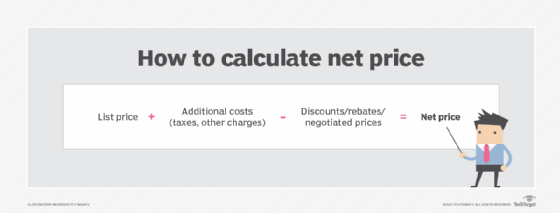net price
What is net price?
The net price is the value at which a product or service is sold after all taxes and other costs are added and all discounts subtracted. Net price is what a customer pays.
To calculate the net price, start with the list price and add any taxes and other government-mandated charges. Then subtract any discounts, rebates or negotiated prices. The result is the net price.
Net price is also referred to as the actual price, and sometimes the negotiated price. For example, when two businesses agree on a contract price for goods or services to be provided over a period of time, that set price is the net price.
What amounts are included in the net price?
Amounts added to the net price include charges for added value, royalties, shipping, duty, taxes, service and installation.
It's important to note that sales taxes, value-added taxes and other government-mandated charges may not be included in the list price but are added at purchase to arrive at the net price.
In some cases, net prices are displayed without including these taxes, stating that taxes will be added at the time of purchase.

Net price related terms
There are several other pricing terms used in conjunction with the net price. We explain their differences below.
List price vs. net price
A list price is the starting point from which net prices are calculated. It's also known as the manufacturer's suggested retail price (MSRP) or "sticker" price.
For example, on a sale tag or listing, the list price is often followed by any amounts for discounts, followed by the discounted subtotal before taxes. The final amount is the net price.
Net cost vs. net price
The net price is sometimes confused with the term "net cost." Net cost is the amount paid by the customer after all discounts and rebates are applied. It does not include any taxes or other added costs.
In contrast, the net price includes all added costs and is the final amount the customer pays.
Gross price vs. net price
Gross price is the total cost of a product or service before any discounts or taxes are applied. To calculate the gross price, start with the list price and add any other charges.
Wholesale price vs. net price
Manufacturers and distributors set wholesale prices. They are the lower prices at which products or services are sold to retailers. Retailers then add their markup to the wholesale price to arrive at the higher price (i.e., the net price).
Using software to determine pricing strategy
The net price is the basis for most product and service pricing strategies. To set the selling price, large and small business owners consider various factors, including product costs, shipping costs, reductions, sales volume and added value.
They also compare their pricing structure to those of their competitors. Many use pricing software to help them determine competitive pricing and an optimal profit margin.
Pricing software considers a variety of factors to help businesses set the final price. These software programs consider manufacturing costs, shipping costs, discounts and added value. They also compare sales prices to those of competitors.
Pricing strategies based on net prices are common because they allow businesses to account for all the costs associated with their products or services. This includes the cost of materials, labor and overhead.
Determining the right price will allow businesses to compare their bottom line and desired profits to their competitors. By using pricing software, companies can optimize their net prices to ensure they get the most for their products or services.
Examples of pricing software include the following:
- Prisync
- Smart Price Optimization and Management
- Price2Spy
- Omnia Dynamic Pricing
- Pricefx
- Wiser Solutions
- KBMax
- Competera Pricing Platform
- BlackCurve
See also: cost of goods sold, ROI, dynamic pricing, cost price, fixed price, equilibrium price
